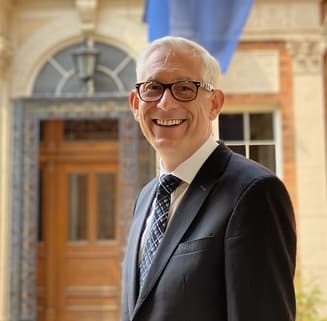What personally excites you about Silicon Valley – and what excites you about Germany as a business location?

What I learned very, very quickly here in the Valley is how closely this ecosystem between founders, startups, Big Tech, partly also financial institutions, and foreign talents is interlinked and how unique it is because of that. I believe what we have here cannot be reproduced elsewhere. You can see how Silicon Valley has been reinventing itself for decades now. What also fascinates me is how much dynamism, financial power, and talent are bundled here, and how the Valley generates these fantastic results that change the world. There's this can-do spirit and also a great communal spirit – that people exchange ideas with each other, provide technological advice, and do things together.
What excites me about Germany as a location is how we have created an economic system with our dual vocational training system that reaches far into society and doesn't just reward academic excellence. Instead, it ensures that broad sections of the population are included in this path of economic development and wealth creation. As a second point, besides political stability and excellent infrastructure, I'm excited about how we as a country poor in natural resources have continually reinvented ourselves. Our strong Mittelstand [mid-sized companies] is the backbone of our economy, constantly pushing into niches, delivering top performance, and taking first place. Whether in mechanical engineering, pharmaceuticals, or biotechnological areas in automotive manufacturing – we are truly excellent across a broad front in many different areas. Our wealth – as a German foreign minister once said – lies between our ears. And one of Germany's greatest strengths is certainly having created a system that has always managed to maintain and promote this wealth. That's something we need to continually nurture and build up. That's also why I particularly welcome the initiative of the Trans-Nation Co-Creation project.
How do you bring this special German spirit to Silicon Valley?
Above all, I must say that there is already a lot of German spirit in Silicon Valley. I now estimate there are about 80,000 Germans in the Bay Area. To bring this spirit to life, I and some colleagues have, among other things, created the so-called German-Tech-Mafia Meeting – an instrument that has been very well received: our last meeting was attended by around 200 German techies. Another tool is our regular meeting that we hold about every three months between the major German institutions established here. In addition to the Consulate General, other institutions include the German House for Research and Innovation or the Goethe Institute, which, despite intensive cultural work, also has a lot to do with technology. We really have a whole range of institutions that bring the German spirit to the country, and it's worth closely linking them together. And if I narrow it down to a very typical German industry, namely automotive manufacturing, then that's something that's running very successfully here. An example of this is Porsche. The company now operates a kind of joint laboratory with Audi in San Jose. This fits in very well technologically and promotes the entire development process.
In everything related to sustainability, thinking, and tech, German companies have very strong positions – and these are values that are urgently needed here and should be further developed. All these topics generate new market opportunities, especially for German companies. In this respect, the Consulate General and I are very aware of our role to continually showcase these values and establish contacts.
Silicon Valley with its special spirit on one side, the special German spirit on the other – what does it mean to engage in this exchange, what do you associate with this co-creation idea?
At the latest since the beginning of globalization, there has been the realization that we live in a world that operates in an increasingly interconnected manner – especially regarding development and technology. There would be no iPhones in our pockets if they weren't assembled for Apple in China. Silicon Valley is a magnifying glass when it comes to economic success and technological breakthroughs in the form of major international co-productions. The major tech companies from Silicon Valley have recognized that a lot is also happening in Germany. It's simply no longer possible to go it alone – neither on the entrepreneurial-technological side nor on the regulatory side. The necessity of this is undisputed on both sides. We need transnational co-creation. That's a very apt mantra that will increasingly accompany us over the next decades and across many areas.
In your opinion, what causes this enormous innovative power in Silicon Valley?
Starting from the early beginnings in the Valley – the first attempts with semiconductors, transistors, and then semiconductor technology – a special structure has docked here to the large academic centers of excellence. Together with the exponential growth, especially in IT software, an increasingly dense infrastructure has developed within a relatively short time.
It's certainly also due to California's location, with the Valley on the West Coast and its close relationships with many Asian partner states. Added to this is immigration from Latin America and also Europe. This has resulted in a highly diverse and financially strong structure that cannot be replicated in this form and particularly thrives on the short, informal paths to investors – who in turn closely observe the high frequency at which young talents leave universities here. Looking at the area of autonomous driving, for example, young companies here are provided with relatively easier and faster opportunities to develop and test their systems and technological products. That's something that particularly distinguishes the Valley. Embedded, of course, in a large economy. Everything here is a bit faster, more productive. The Valley also found its way well through the pandemic. Many left, even more came. There is so much influx, immigration, and so much talent here that explain this great success.

What can German companies learn most from Silicon Valley, where do you see the greatest opportunities for adaptation?
In the overarching, almost philosophical area, one can learn this can-do mentality. And also with regard to risks, to things that can go wrong. When a product is developed here, the first focus is on what it brings, how far it can still be pushed. Take the example of Tesla, where they say: We'll build everything in first, we can always reduce later. That's thinking from two different sides. Germany can learn from this, among other things, the speed of approval procedures. Opening a business here in the Valley is just incomparably faster. Also, capital, especially venture capital that might also be sunk, is available in completely different dimensions. That's something that still needs to develop in Germany. Here, venture capital also means that it's associated with quite high failure rates in some areas – but also with learning effects. If someone fails here in the Valley and gets up again, people trust that they have learned and will take the next steps even more successfully. Therefore, I always advise companies that come here to visit to do less "window shopping", that is, not just to look, but to come with their own problems or work questions and say, look, this is what we're currently working on – what solutions do you have? This leads to a working dialogue from which business initiation and contacts result.
I see that there are now also competitions and technology centers growing in Germany, and that alongside the Mittelstand structure, a startup mentality is increasingly spreading among the younger generation: Developing a product, scaling it, operating it for four or five years, then selling it and maybe doing something completely different afterward. This is still a big difference, that here in the Valley you can try out, test, and also jump from industry to industry – quite contrary to the sometimes still old professional images in Germany. There, one tends to develop expertise and specialization in the long term. Setting up broadly, trying different things, and also failing sometimes – that's a model that doesn't yet exist like that in Germany.
What support do you provide from San Francisco for the participating companies of the Trans-Nation Co-Creation project?
One pillar is to open doors here on site, establish networks, and get contacts underway. For this, we host numerous events here at our residence. On the other hand, I also attend many events and bring together German companies, startups, institutions, and decision-makers with local companies and institutions. This involves technology, automotive and aircraft construction, logistics, photonic industry – internal investments, but also initiating partnerships. We facilitate conversations with local decision-makers and even closer integration.
The second pillar is to report on what's happening here, what's developing here, what market opportunities are emerging here, especially for German companies. We also want to remove the timidity, especially from young people, and say, come over, make your pitch, represent your product. All of this needs partners, and we have them. And it needs the intersections of science, business, and political decisions. These are all very, very exciting topics that also require transatlantic exchange.
Dear Mr. Schramm, thank you very much for these exciting insights into the possibilities and opportunities for successful co-creation between Germany and Silicon Valley!